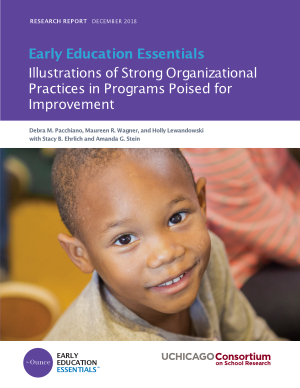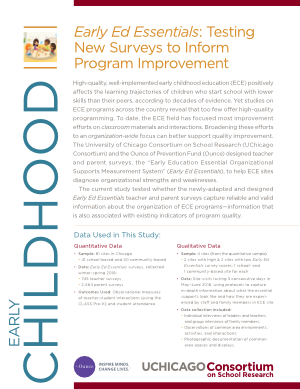Extensive evidence demonstrates that high-quality early childhood education (ECE) positively impacts the learning trajectories of children. Yet many early childhood programs struggle to implement high-quality programming, failing to sufficiently advance children’s early learning. A growing body of research demonstrates that strong organizational conditions are necessary to lift stagnant levels of quality in ECE settings.
The Early Education Essentials measurement system, created in partnership with Start Early, including teacher/staff and parent surveys and data-use and improvement tools, is now available nationwide for use in early childhood school- and community-based settings. The new research in Early Education Essentials: Illustrations of Strong Organizational Practices in Programs Poised for Improvement provides valuable qualitative descriptions of strong organizational environments and how they empowered leaders, teachers, and families to aspire to and realize higher-quality practices and better outcomes for young children.
Key Findings
- Internal organizational conditions greatly affect what teachers do, what parents do, and how staff and families feel about the school/center. These actions in turn impact the quality of teaching and learning, and ultimately the outcomes children achieve.
- Program leaders can bring coherency to the purpose and focus of ECE programs and minimize fragmented and task-based approaches. In strongly organized programs, leaders achieved coherency and quality by focusing on teachers’ practice and working collaboratively with teachers, staff, and families.
- Policymakers seeking to retain staff and ensure high-quality programming within ECE schools/centers can prioritize policies that promote these essential organizational structures and practices over other program standards, which have not been linked to staff commitment, higher-quality teaching, or outcomes.






